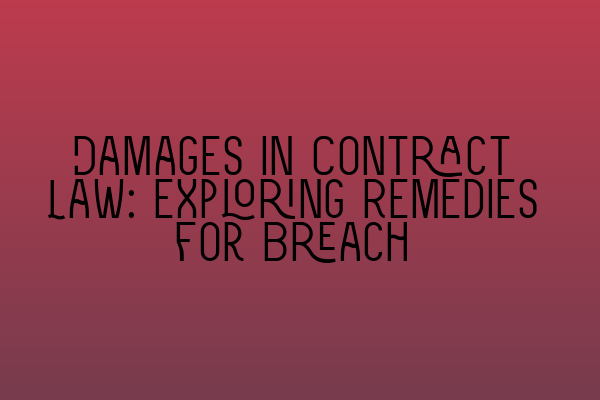Damages in Contract Law: Exploring Remedies for Breach
Introduction
When entering into a contract, all parties have the reasonable expectation that the terms of the agreement will be fulfilled. However, there are instances when one party fails to perform their obligations, resulting in a breach of contract. In such situations, the innocent party may seek remedies, including damages, to compensate for the loss caused by the breach. In this article, we will delve into the concept of damages in contract law and explore the various types of remedies available.
1. What are Damages?
Damages refer to the monetary compensation awarded to the innocent party to remedy the loss suffered due to a breach of contract. The underlying principle of damages is to place the injured party in the position they would have been in had the breach not occurred. The aim is to provide a fair and just outcome for the affected party.
2. Types of Damages
a) Compensatory Damages
Compensatory damages are the most common type of damages awarded in contract law cases. These damages aim to compensate the innocent party for the actual loss suffered due to the breach. There are two subcategories of compensatory damages: expectation damages and reliance damages.
Expectation damages seek to put the injured party in the position they would have been in if the contract had been performed as agreed. This includes not only the direct loss suffered but also anticipated profits or benefits that were reasonably expected from the contract.
Reliance damages, on the other hand, focus on compensating the injured party for the expenses incurred in reliance on the contract. This may include costs associated with preparing for the performance of the contract or expenditures made based on the expectation that the contract would be fulfilled.
b) Consequential Damages
Consequential damages, also known as special damages, go beyond the direct loss suffered and address the additional harm caused by the breach. These damages are contingent upon the breaching party’s awareness of the special circumstances that would result in such harm. It is important to note that consequential damages must be reasonably foreseeable at the time the contract was formed.
3. Mitigation of Damages
In contract law, the innocent party has a duty to mitigate their damages to the extent reasonably possible. This means taking reasonable steps to minimize the loss caused by the breach. Failure to mitigate damages may result in a reduction of the damages awarded by the court.
4. Liquidated Damages
Liquidated damages are pre-determined damages stipulated in the contract itself. Parties may include a clause specifying the amount of damages to be paid in the event of a breach. These damages are enforceable if they are a genuine pre-estimate of the loss likely to be suffered as a result of the breach. However, if the liquidated damages are deemed excessive and punitive, they may be deemed unenforceable by the court.
5. Nominal Damages
Nominal damages are minimal damages awarded to the innocent party when a breach of contract has occurred, but no actual loss has been suffered. It signifies that the court recognizes the party’s rights have been violated, even if the monetary impact is insignificant.
6. Punitive Damages
Unlike other areas of law, contract law does not generally award punitive damages. The primary focus is on compensating the injured party rather than punishing the breaching party. However, there might be exceptional situations where punitive damages can be claimed, such as when the breach involves fraud or malicious conduct.
Conclusion
Damages play a crucial role in contract law, providing a means for the innocent party to be compensated for the loss suffered due to a breach. Whether it is compensatory damages, consequential damages, liquidated damages, nominal damages, or punitive damages, the aim is to restore fairness and place the injured party in the position they would have been in had the breach not occurred.
If you need assistance navigating legal challenges and pitfalls in your practice, check out our related article: “Navigating Legal Challenges and Pitfalls in Your Practice”.
For a comprehensive comparison between barristers and solicitors, read our related article: “Barrister vs. Solicitor: A Comprehensive Comparison”.
Understanding the SRA Competence Statement is crucial for solicitors. Learn more in our related article: “Understanding the SRA Competence Statement: A Guide for Solicitors”.
If you’re interested in exploring different solicitor specializations and finding your niche, our related article is a must-read: “Exploring Different Solicitor Specializations: Finding Your Niche”.
Are you considering a career in law? Check out our top recommendations for law schools in the UK in our related article: “Top Recommendations for Law Schools in the UK”.
Remember, when it comes to damages in contract law, seeking professional advice from a solicitor who specializes in contract law is crucial. A qualified solicitor will guide you through the complexities of contractual disputes and help you navigate the remedies available to you.
